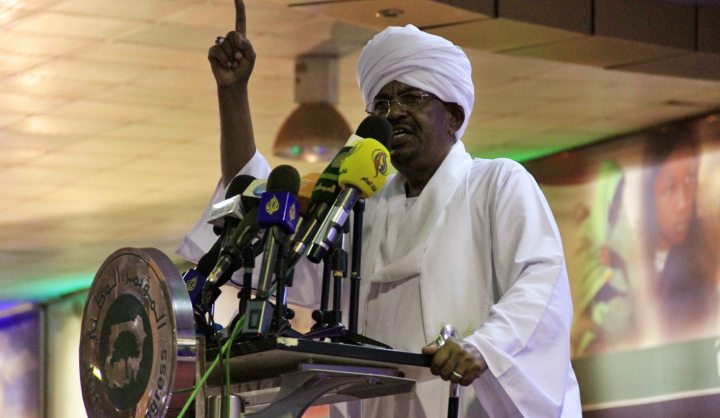South Africa
Sudan: Darfuri students targeted in post-election crackdown

In the aftermath of April’s general election – convincingly won by President Omar Al-Bashir’s party, but boycotted by all major opposition groups – the Sudanese government has wasted little time in reasserting its authority in the capital, with students from Darfur bearing the brunt of the crackdown. By NUBA REPORTS.
The targeting of Darfuris in Sudan’s capital Khartoum is at a historic high.
This month a university women’s hostel housing mostly Darfurians burned down with no apparent cause. The National Intelligence and Security Service (NISS), a government agency under the ruling party’s direction, has collectively raided homes in search of Darfuri university students, beating and detaining students and relatives at large. As of May 7, over 200 Darfuri students and relatives were forcibly detained—many remain in detention where there have been reports of physical and sexual abuse. One member of the Darfuri Students’ Union was raped in detention according to sources on the ground.
“The regime is desperate; the racist targeting is escalating,” Ahmed Hussain Adam, a Visiting Fellow at Cornell University’s Institute for African Development, said of the crackdown. “The government is setting the stage and creating an environment of fear, hate and racism in the universities. Darfuri students are experiencing [an] unprecedented racist bloody campaign by the ruling party’s student wing militias as well as the National Intelligence and Security Service.”
The ruling National Congress Party (NCP) discussion of targeting Darfurians is ominously similar to the way language has been used to incite ethnic violence in other conflicts. The NCP student wing told supporters in a press conference that no Darfuri students should be allowed to enter universities, assemble or organize, and that all should be evicted by any means necessary or “be burnt in his or her room”. Islamist students were allegedly told to retaliate against “any movement’s political agenda or demands”.
The Secretariat of Higher Education in Khartoum North echoed these demands and expelled all Darfuri student activists from university residences.
Khartoum’s ethnic violence spiralled after the death of Mohamed Awad, a leading member of the NCP student organisation, who died from injuries sustained during clashes between the NCP group and students supporting Darfuri rebel groups. The Darfuri students were holding a peaceful meeting at the East Nile University in Khartoum when a reported 150 NCP students, with support from National Intelligence and Security Service, stormed the meeting and violence broke out. Witnesses reported that dozens were injured, some critically.
“Darfuri students are in hiding, afraid they’ll be arrested if they go to their universities, even though they are innocent,” explained Adam, Cornell’s Visiting Fellow and an activist in contact with Darfurians in Khartoum. “They’re telling me, ‘we don’t want to continue like this’.”
The ethnically based targeting comes after President Omar al-Bashir’s disputed victory in last month’s presidential elections, which saw a historically low turnout. The political opposition boycotted the elections in response to Bashir’s refusal to hold an inclusive national dialogue. The international community discredited the elections and condemned them as unfair.
The ongoing ethnic violence points to Bashir’s continued unwillingness to hold a national dialogue—a central and recurring demand in the ranging opposition groups’ many negotiations with the administration in Khartoum. Instead of participating in talks with the opposition, the government shut down 14 newspapers and intensified the military campaign against rebels (and civilians) in South Kordofan.
Despite government retaliation, university students in Khartoum play a significant role in political activism and hold frequent demonstrations. Opposition groups have stated their determination to overthrow Bashir’s regime. It’s not the first time students have played a key role. They were instrumental in toppling military regimes in 1964 and 1985. Now it seems the ruling party fears the student movement could contribute to a popular uprising, according to Yasir Arman, a secretary general in Sudan People’s Liberation Movement-North, the prominent rebel group in Blue Nile and South Kordofan states south of Khartoum where conflict with government forces will soon enter its fifth year.
There is also a history of government supporters using violence to silence university students in Khartoum. A university student, al-Tayeb Salih, was kidnapped and killed in January 2015. Mohamed Suleiman, also a university student, was abducted in 2014, his dead body later found. And in 2013, Ali Abakar, an economics student at the University of Khartoum, was shot dead when the security and police forces used live bullets to disperse a Darfuri-led demonstration. Four Darfuri students were killed in clashes with pro-government students in the same year.
Arman emphasized the similarity in the current government response in Khartoum to military action against rebel groups where war outside the city is ongoing, in Darfur, Blue Nile, and South Kordofan. “In a way this is connected to what’s going on in Darfur,” Ahmed Hussain Adam said regarding the government capture of Darfuri students, “They [the Sudanese government] consider them a security threat.”
According to a spokesman from the opposition Sudan Liberation Movement – Minni Minnawi (SLM-MM), the recent targeting of Darfurians in Khartoum is an extension of violence in Darfur, where government forces are fighting Darfuri rebel groups. According to the party’s statement, some Islamist student messages on social media, when translated from Arabic, read, “We will deal with you here in Khartoum in the same way our Armed Forces are dealing with you in the battle field.” DM
Nuba Reports is a single topic media organisation that focuses exclusively on the internal wars in Sudan. All reporting is done by Sudanese journalists who live in the conflict zones.
Photo: Omar Hassan al-Bashir addresses supporters after his win in the Presidential election, Khartoum, Sudan, 27 April 2015. EPA/MORWAN ALI


















 Become an Insider
Become an Insider